- Home
- Dan Gutman
The Titanic Mission Page 12
The Titanic Mission Read online
Page 12
For thine is the kingdom,
The power, and the glory,
For ever and ever.”
“Amen,” mumbled a chorus of voices.
“I don’t believe in any religion,” said a lady in the back of the boat when they were finished. “Not anymore. How could a loving and all-powerful God allow tragedy like this to happen?”
“God works in mysterious ways,” another lady replied.
“Let’s not get started,” somebody else said.
They sat there in the darkness for what seemed like a long time. Luke was restless. He didn’t like waiting in line for Red Sox tickets, or waiting in line for the cannolis at Mike’s Pastry in Boston. And he certainly didn’t like waiting for a ship to come and save his life.
“We’ve got to do something,” Luke said. “If a ship came to rescue us, how would it even know we’re here?”
“The boy is right,” one of the ladies said. “We’re invisible in the dark. A ship coming to rescue us might run right over us.”
“We should make a signal,” suggested Isabel. “Does anybody have a cigarette lighter?”
“I have a box of matches,” one lady volunteered.
“I have some paper,” offered another. “It’s pretty dry.”
“You can burn my hat,” someone else said.
They passed the matches and hat forward. David put the hat at the end of his oar and lit one of the feathers. It flared up. Once a little fire was established, Luke and David held the oar high in the air so it could be seen from a distance.
“You’re wastin’ your time, I say,” said Mr. Strong. “Ain’t nobody out there to see that.”
“We’ve got to try something,” said Julia.
Actually, Mr. Strong was right. There was no ship in the area to see the burning hat. But people in the other lifeboats saw it. Soon there were hats, handkerchiefs, newspapers, and other objects in flames lighting up the night. A green flare shot up from one lifeboat.
In a few minutes, the fires had burned out in all the boats and the only light that could be seen was a wooden cane with a little flashlight at the end that somebody was waving in the air. A feeling of gloom settled over the passengers.
“Happy now?” Mr. Strong grumbled. “You coulda set the whole boat on fire.”
The Flashback Four were pretty sure all the people who made it into the Titanic’s lifeboats did get rescued. But they didn’t know for sure, and they didn’t know how long it took. None of them had researched that part of the story.
“We’ll be rescued soon, I’m sure of it,” one lady said. “Keep a positive outlook! That’s what I say.”
“You keep a positive outlook,” said another one. “My husband is dead. I have nothing.” Then she started weeping.
All was silent as the women in the boat thought about the loved ones they had lost. Luke, David, Julia, and Isabel kept quiet, out of respect.
“I’m hungry,” somebody finally said.
“I’m thirsty.”
Everyone searched their pockets, but nobody in the boat had thought to bring anything to eat. And in 1912, people didn’t carry bottles of water with them wherever they went.
It’s commonly known that a person can survive a few weeks without food. But water is another thing. Most of the human body is made of it, and every living cell needs it to keep functioning. It lubricates our joints, regulates our body temperature, and helps to flush waste from our system. You can’t live for more than a few days without water.
Isabel looked around. There was nothing but water for hundreds of miles in every direction. But you can’t drink salt water. It reminded her of a poem she had learned in her honors English class . . .
“Water, water, everywhere,
And all the boards did shrink;
Water, water, everywhere,
Nor any drop to drink.”
“What’s that?” asked Julia.
“‘The Rime of the Ancient Mariner,’” Isabel told her. “It’s by Samuel Taylor Coleridge. We had to memorize it in school.”
“Never heard of it,” said Julia.
It was past three o’clock in the morning now. Everybody was cold and wet. Hungry and thirsty. Frustrated. Angry. Worried. Sorrowful.
But most of all, they were tired. Few people in the lifeboat could remember the last time they had slept.
And so, one by one, they fell asleep.
CHAPTER 16
A BEAUTIFUL MORNING
WHILE THE FLASHBACK FOUR AND THE OTHERS IN the lifeboat slept fitfully, the Earth kept right on spinning. As it did, the stars gradually disappeared, and the sun crept up over the horizon. The sky was turning light blue, and the temperature was on the way up.
When the survivors of the Titanic woke up, they were treated to an amazing sight—a string of icebergs stretching out in all directions. Some of them towered sixty feet above the water. Others—called growlers—were the size of small cars. The morning sun reflecting off the ice made it sparkle with color—pink, blue, lavender, and white.
It was a beautiful scene, or it would have been a beautiful scene if you didn’t stop and remember that a berg just like one of those had sliced open the Titanic and caused the death of so many innocent people.
“I thought maybe it was all a dream,” Julia said after she opened her eyes. “But it really happened.”
Julia’s hair was all messed up. Everyone’s hair was messed up, their clothes wrinkled and stained. The society ladies who spent hours every day making themselves look pretty now looked, well, pretty lousy. It’s hard to look perfect when you’ve spent the night sleeping while sitting up in your clothes. And nobody cared. They were all in the same boat (so to speak). The important thing was that they had survived the night.
The water was no longer as calm as it had been the night before. Ocean swells lifted the boat up and lowered it down again. A few people on one side got up and moved to the other side to help balance the weight. Nobody needed to be told. They just did it because it had to be done. In the distance, the people in some of the other lifeboats had tied their boats together in a little flotilla.
As the ladies were stretching their arms and saying “Good morning” to one another, there was a very faint sound in the distance. It might have been a foghorn or a bird. Or it could have been just wishful thinking. Nobody got excited until an object could be clearly seen on the horizon. It wasn’t a mirage, and it wasn’t a hallucination.
“I see a ship!” somebody shouted. “A big one!”
“We’re going to be saved!”
The yelling and cheering that erupted was so loud that it overwhelmed another sound—the blast of the ship’s whistle. Women who had been total strangers a few hours earlier were hugging each other like long-lost friends. They almost tipped the boat over in their exuberance. It would be hard to imagine happier people than these.
It was sort of like the old joke:
Q: Why are you banging your head against the wall?
A: Because it feels so good when I stop.
“Over here!” Everyone was shouting and waving their hands in the air.
While several ships had received the SOS from Titanic before it went under, only one had come to its rescue. That was the Carpathia, a nine-year-old passenger steamship that was heading for Europe. When the captain learned that Titanic was in trouble, he quickly changed course and rushed to help.
Carpathia was about half the size of Titanic and couldn’t move as fast. The captain had the ship’s hot water turned off so he could push its engines up to twenty miles per hour. Carpathia had come from fifty-eight miles away, weaving its way carefully around the icebergs dotting the north Atlantic.
“Let’s go!” David shouted to Luke as the rescue ship got closer. “Row!”
The pair pulled the oars with renewed enthusiasm, and as a result their lifeboat was one of the first ones to reach the Carpathia.
As it got closer, the engines were cut to reduce the wake and avoid bumping into any of the
lifeboats.
“Ahoy!” a crew member shouted from the deck. “Are you people from the Titanic?”
It seemed like the dumbest question in history. Why else would they be floating around the middle of the Atlantic Ocean in a lifeboat?
“Yes!” everyone shouted.
“And we are more than a little happy to see you!” one of the ladies hollered.
A series of slings and rope ladders were lowered along the side of the Carpathia. Luke and David maneuvered the lifeboat over. Julia grabbed a rope and tied it to the lifeboat.
“Age before beauty,” Isabel said as she helped an elderly lady stand up and get into a rope sling. “Okay, take her up!”
The crew of the Carpathia pulled the sling up using a pulley system, and then lowered it back down to pick up the next passenger.
The Flashback Four helped the rest of the ladies step out of the boat. It took a while to get all of them. Some of the ladies were very old, and some of them were injured or unsteady on their feet.
Eventually, the only people left in the lifeboat were the Flashback Four and Mr. Strong.
“After you, sir,” David said, bowing deeply and gesturing for Mr. Strong to get into the sling.
Mr. Strong grunted and got in.
Finally, Isabel and Julia hopped into two slings, which bumped against the side of the Carpathia a few times on the way up. Neither of the girls seemed to mind. Luke and David decided to race up the rope ladders instead of waiting for the slings to be lowered back down again.
It took a few hours to pick up all the passengers in the lifeboats. By eight thirty in the morning, the seven hundred survivors of the Titanic were safely aboard the Carpathia. As they got up to the top, many people fell to their knees and kissed the deck as if it was solid ground. Luke, David, Julia, and Isabel had a long group hug.
“We made it,” Julia said, tears streaming down her cheeks.
Nobody seemed to be bothered that the Flashback Four were standing there in their underwear. The deck was littered with Titanic survivors milling around in various stages of undress.
You have to hand it to the passengers and crew of the Carpathia. They could have been annoyed that their trip had been interrupted. They would have had every right to be angry when word got around that the captain had decided to change course and go back to New York instead of continuing on to Europe. Instead, they welcomed the Titanic survivors, giving them everything from hot soup, coffee, and tea to new shoes and toothbrushes.
“You poor dears,” a woman with an Italian accent said, putting an arm around Julia. “What you must have been through!”
“You don’t know the half of it,” Julia replied.
The Italian woman insisted on taking the Flashback Four to her stateroom and giving them clothes to wear. She said she had eight children, so she had things in lots of different sizes. Isabel and Julia had fun pulling dresses out of the trunk on the floor. They were nowhere near as fancy as the clothes they had been wearing before, but they were perfectly nice.
“My kids will never miss them,” she said as Luke found a pair of shoes that almost fit his big feet. The Flashback Four thanked her repeatedly, and Julia tried to give her a wet hundred-dollar bill, but she refused to accept it.
“Do unto others as you would have them do unto you,” the Italian lady said. “That’s the Golden Rule.”
It was past nine o’clock in the morning. The blast of a horn and the vibration under the floor indicated that the Carpathia’s engines had started up again. By the time the Flashback Four had changed into their new clothes and got back up to the deck, the ship was already churning through the water.
The rail at the stern of the ship was lined with Titanic survivors looking sadly into the distance. So many of their loved ones were gone. Later, the Carpathia would come to be referred to as “the ship of widows.”
The Flashback Four went to the rail too. It was impossible not to glance backward, to where the Titanic had been floating a few hours earlier.
“Do you think there’s anything we could have done?” David asked wistfully.
“We tried,” Isabel replied. “We did what we could.”
They walked up the deck to the front of the ship, where some of the other passengers had gathered.
“What happens now?” asked Julia, looking at the distant horizon as Carpathia sliced through the water.
It was a good question. None of them had spent any time researching what happened after the Titanic sank. They assumed they would be safe at home by that time, and it wouldn’t matter.
“I don’t know,” said David. “I guess our lives begin all over again.”
CHAPTER 17
THE FUTURE
STARTING OVER.
It sounds like it could be a good thing to go back and live your life all over again in a different time and a different place. You’d get a fresh start. Everything would be new, different, and exciting. All the dumb things you did or said in the past would be forgotten. The people you don’t like would be gone. And of course, you would know more than everybody else, because you would have lived through things that hadn’t happened yet.
The first thing that Luke thought about was his beloved Boston Red Sox. It was April, the beginning of baseball season. He knew the Sox would have a great season and win the World Series in 1912. And just two years later, they would sign a teenage pitcher who would lead the team to three World Series championships and change the game of baseball forever. His name was Babe Ruth. What a great time to be a Red Sox fan! Maybe starting over again in 1912 wouldn’t be so bad.
David wasn’t having such pleasant thoughts. He was thinking about the things his parents had told him that African Americans had to deal with every day back in “the good old days.” Bigotry. Prejudice. Discrimination. Hotels, restaurants, and water fountains you weren’t allowed to use because of your skin color.
And the Red Sox, of course. They would be the last team in major league baseball to put a black player on the field. He would have to wait until 1959—a dozen years after Jackie Robinson broke the color barrier—before the Sox would finally sign infielder Pumpsie Green.
David also remembered from his social studies class that World War I would start in 1914 and last four years. He would be eighteen when the war ended. He might very well get drafted and sent to fight and possibly die.
Like David, Isabel was filled with dread about starting over in 1912. She would have to spend the rest of her life without her parents. She wouldn’t have her brothers and sister anymore. Her grandparents would be gone. So would her other friends back home. She would never see her house again, or her bedroom with her stuffed animals in it. She would never see her school, or her teachers. Everything she knew and loved would be gone. She would miss her kitten, Foozle.
Isabel did the math in her head. Her parents were born in the 1970s. So if she was starting all over again in 1912, she would be in her seventies around the time when her parents would be born. She could meet them possibly, but then she would be meeting them when they were just kids, and that would be weird. The thought of living the rest of her life without her loved ones made her want to cry again.
“I have no family anymore,” Isabel told the others.
They gathered around, putting their arms around her.
“We’ll be your family,” Julia told her.
For Julia, starting life over again in 1912 presented all kinds of interesting opportunities. She still had those ten hundred-dollar bills in her pocket. That was more than the average American worker made all year in 1912. You could buy sugar for four cents a pound and a dozen eggs for fourteen cents. They could live like royalty on that money.
Not only that, but it occurred to Julia that there was a way she could make much more money than that.
“Hey, guys,” she said as they walked the deck of the Carpathia. “I just got a brilliant idea!”
“This I want to hear,” David said.
Julia lowered her voice so the peop
le walking around could not hear her.
“We could make a fortune by inventing something nobody ever heard of,” she whispered.
“What do you mean?” Isabel asked.
“It’s 1912,” Julia explained. “There’s a lot of stuff we grew up with that they don’t have here. We can invent it, sell it, and make a killing.”
“Like what?” asked Luke.
“Like . . . television,” Julia replied. “These people have no idea what television is. They’ve never seen one.”
“So you’re going to invent television?” asked Isabel. “You know how to build a TV?”
“Well, that was a bad example,” Julia said. “But there’s lots of stuff that we could make.”
As a group, they brainstormed to come up with products that people didn’t have in 1912. The refrigerator (1913). The traffic light (1914). Scotch tape (1930). Twinkies (1930).
“This whole idea sounds kinda wrong,” Isabel pointed out. “It’s like, cheating.”
“So what?” Julia said. “Nobody would ever know we came from the future. This is a survival situation, y’know. We have no parents. No homes. No nothing. All we have is what’s in our heads. We’ve got to use our heads to survive.”
A newspaper was sitting on an empty deck chair, so Julia picked it up and paged through it, looking for ideas.
“Look at this,” she said. “There’s no crossword puzzle in this paper. Maybe they didn’t have crossword puzzles in 1912. So we could invent it!”
(Actually, the first crossword puzzles would appear just one year later, in the New York World newspaper.)
“Making a crossword puzzle is hard,” Isabel said. “I saw something on TV once about the people who make crossword puzzles. They’re, like, geniuses.”
Julia put the newspaper back on the deck chair and kept trying to think of something they could invent that didn’t exist in 1912. Luke said he had to use the bathroom, and he went off to find one. That’s when Julia came up with another idea.
“I’ve got it!” she said, snapping her fingers. “The zipper!”

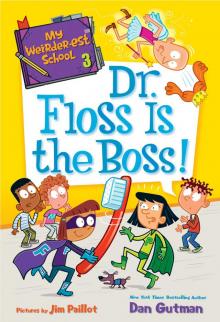 My Weirder-est School #3
My Weirder-est School #3 Bummer in the Summer!
Bummer in the Summer!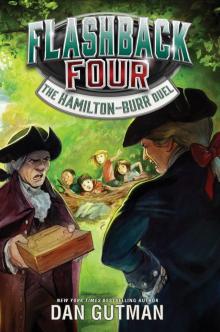 Flashback Four #4
Flashback Four #4 Miss Blake Is a Flake!
Miss Blake Is a Flake!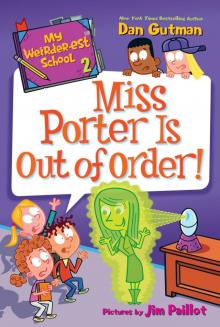 My Weirder-est School #2
My Weirder-est School #2 My Weirder-est School #1
My Weirder-est School #1 Miss Aker Is a Maker!
Miss Aker Is a Maker!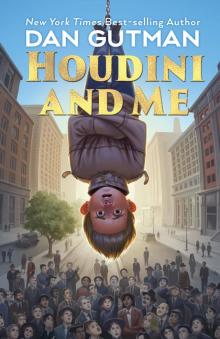 Houdini and Me
Houdini and Me Mr. Marty Loves a Party!
Mr. Marty Loves a Party! Ms. Jo-Jo Is a Yo-Yo!
Ms. Jo-Jo Is a Yo-Yo!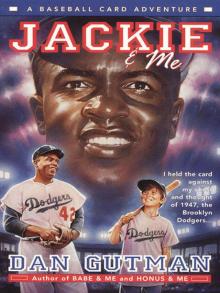 Jackie & Me
Jackie & Me Miss Newman Isn't Human!
Miss Newman Isn't Human!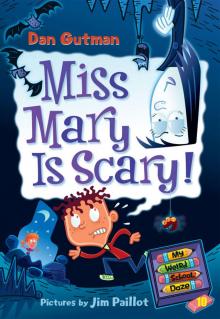 Miss Mary Is Scary!
Miss Mary Is Scary!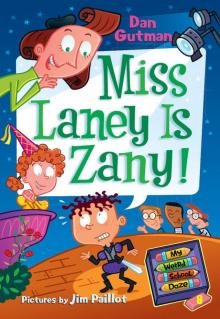 Miss Laney Is Zany!
Miss Laney Is Zany!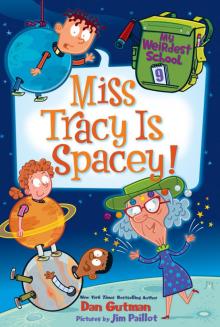 Miss Tracy Is Spacey!
Miss Tracy Is Spacey! Ms. Krup Cracks Me Up!
Ms. Krup Cracks Me Up! Mrs. Cooney Is Loony!
Mrs. Cooney Is Loony! Dr. Nicholas Is Ridiculous!
Dr. Nicholas Is Ridiculous! My Weird School Special
My Weird School Special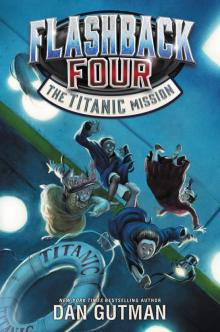 The Titanic Mission
The Titanic Mission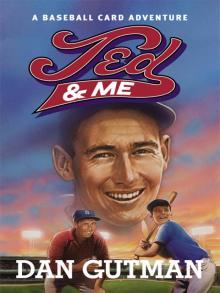 Ted & Me
Ted & Me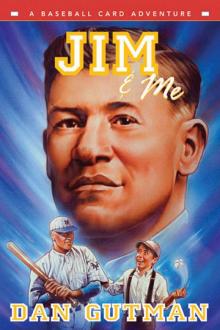 Jim & Me
Jim & Me Miss Child Has Gone Wild!
Miss Child Has Gone Wild! The Talent Show
The Talent Show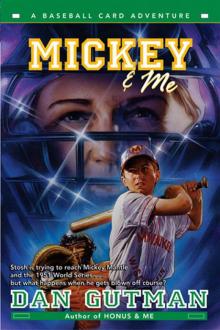 Mickey & Me
Mickey & Me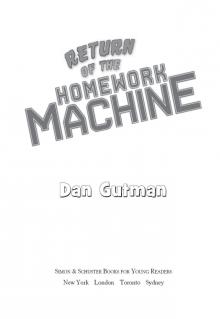 Return of the Homework Machine
Return of the Homework Machine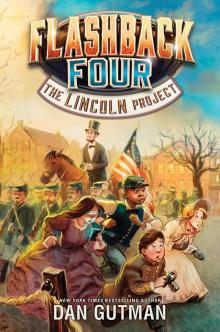 The Lincoln Project
The Lincoln Project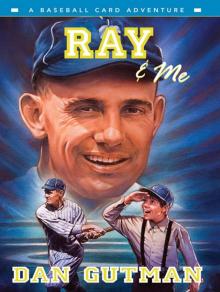 Ray & Me
Ray & Me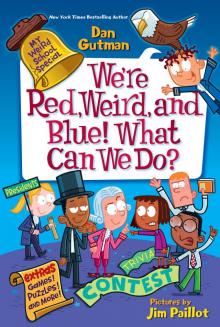 We're Red, Weird, and Blue! What Can We Do?
We're Red, Weird, and Blue! What Can We Do? The Get Rich Quick Club
The Get Rich Quick Club Funny Boy Versus the Bubble-Brained Barbers from the Big Bang
Funny Boy Versus the Bubble-Brained Barbers from the Big Bang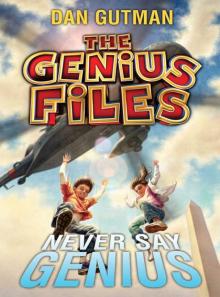 Never Say Genius
Never Say Genius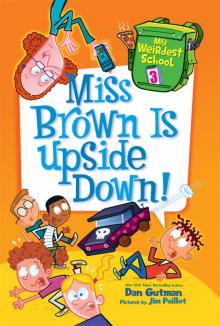 Miss Brown Is Upside Down!
Miss Brown Is Upside Down!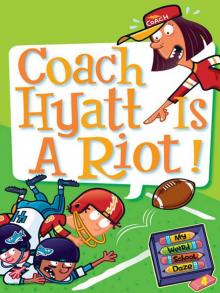 Coach Hyatt Is a Riot!
Coach Hyatt Is a Riot! The Christmas Genie
The Christmas Genie Mr. Burke Is Berserk!
Mr. Burke Is Berserk! Mr. Louie Is Screwy!
Mr. Louie Is Screwy! Mrs. Roopy Is Loopy!
Mrs. Roopy Is Loopy! Ms. Sue Has No Clue!
Ms. Sue Has No Clue!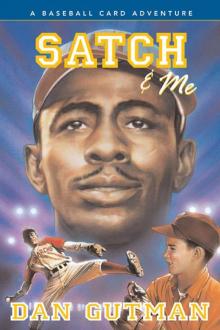 Satch & Me
Satch & Me Mr. Cooper Is Super!
Mr. Cooper Is Super! Oh, Valentine, We've Lost Our Minds!
Oh, Valentine, We've Lost Our Minds! Miss Small Is off the Wall!
Miss Small Is off the Wall!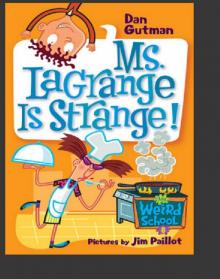 Ms. LaGrange Is Strange!
Ms. LaGrange Is Strange! Funny Boy Meets the Dumbbell Dentist from Deimos (with Dangerous Dental Decay)
Funny Boy Meets the Dumbbell Dentist from Deimos (with Dangerous Dental Decay) Miss Daisy Is Still Crazy!
Miss Daisy Is Still Crazy! Ms. Leakey Is Freaky!
Ms. Leakey Is Freaky!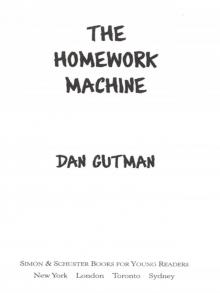 The Homework Machine
The Homework Machine Miss Holly Is Too Jolly!
Miss Holly Is Too Jolly! Mrs. Meyer Is on Fire!
Mrs. Meyer Is on Fire!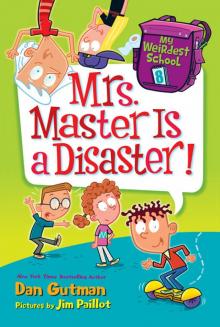 Mrs. Master Is a Disaster!
Mrs. Master Is a Disaster! Ms. Beard Is Weird!
Ms. Beard Is Weird!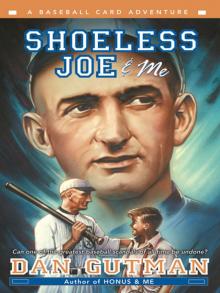 Shoeless Joe & Me
Shoeless Joe & Me Funny Boy Meets the Airsick Alien from Andromeda
Funny Boy Meets the Airsick Alien from Andromeda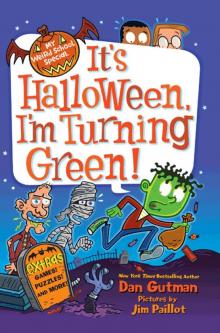 My Weird School Special: It’s Halloween, I’m Turning Green!
My Weird School Special: It’s Halloween, I’m Turning Green! Mrs. Lane Is a Pain!
Mrs. Lane Is a Pain! Miss Klute Is a Hoot!
Miss Klute Is a Hoot!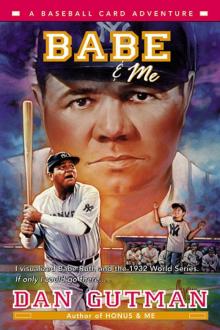 Babe & Me
Babe & Me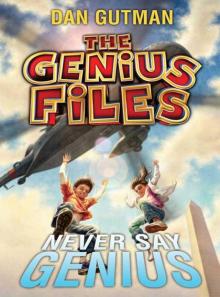 The Genius Files 2 Never Say Genius
The Genius Files 2 Never Say Genius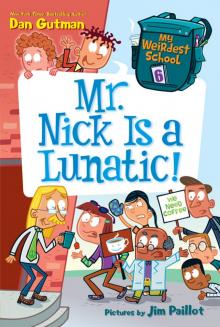 Mr. Nick Is a Lunatic!
Mr. Nick Is a Lunatic!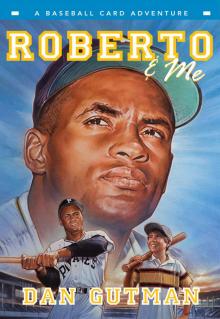 Roberto & Me
Roberto & Me Mrs. Lizzy Is Dizzy!
Mrs. Lizzy Is Dizzy! Mrs. Dole Is Out of Control!
Mrs. Dole Is Out of Control! Mrs. Patty Is Batty!
Mrs. Patty Is Batty! Mr. Granite Is from Another Planet!
Mr. Granite Is from Another Planet! Dr. Brad Has Gone Mad!
Dr. Brad Has Gone Mad!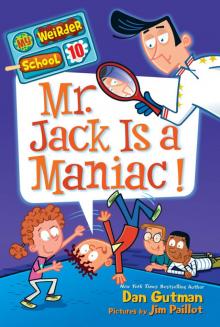 Mr. Jack Is a Maniac!
Mr. Jack Is a Maniac! Funny Boy Takes on the Chit-Chatting Cheeses from Chattanooga
Funny Boy Takes on the Chit-Chatting Cheeses from Chattanooga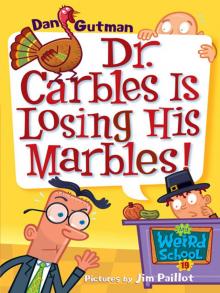 Dr. Carbles Is Losing His Marbles!
Dr. Carbles Is Losing His Marbles!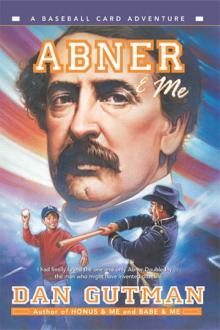 Abner & Me
Abner & Me Ms. Hannah Is Bananas!
Ms. Hannah Is Bananas! My Weirdest School #2
My Weirdest School #2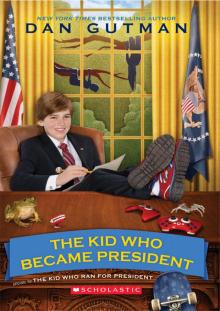 The Kid Who Became President
The Kid Who Became President Mrs. Kormel Is Not Normal!
Mrs. Kormel Is Not Normal! Getting Air
Getting Air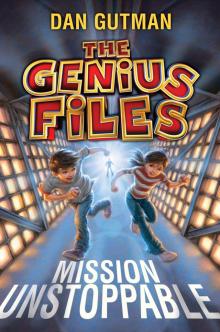 Mission Unstoppable
Mission Unstoppable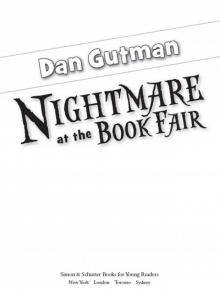 Nightmare at the Book Fair
Nightmare at the Book Fair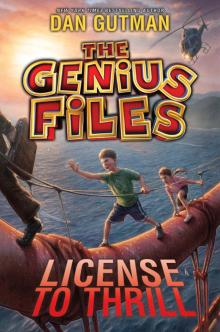 License to Thrill
License to Thrill Mrs. Jafee Is Daffy!
Mrs. Jafee Is Daffy! Mr. Sunny Is Funny!
Mr. Sunny Is Funny! Mr. Hynde Is Out of His Mind!
Mr. Hynde Is Out of His Mind! The Kid Who Ran For President
The Kid Who Ran For President The Genius Files #4
The Genius Files #4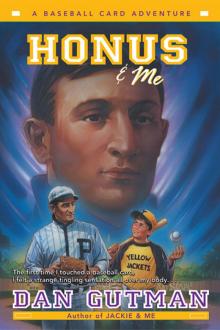 Honus & Me
Honus & Me Mr. Tony Is Full of Baloney!
Mr. Tony Is Full of Baloney! Miss Suki Is Kooky!
Miss Suki Is Kooky! Ms. Hall Is a Goofball!
Ms. Hall Is a Goofball!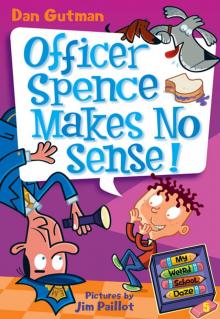 Officer Spence Makes No Sense
Officer Spence Makes No Sense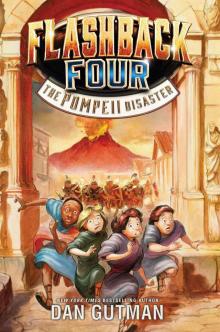 The Pompeii Disaster
The Pompeii Disaster Mr. Will Needs to Chill!
Mr. Will Needs to Chill!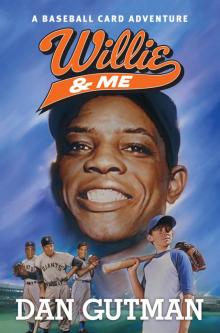 Willie & Me
Willie & Me Ms. Todd Is Odd!
Ms. Todd Is Odd!